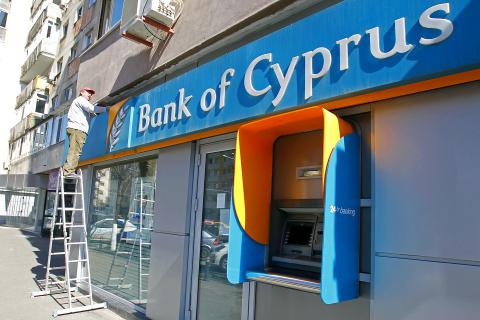Cyprus plans to lift a ban on casinos and offer firms tax exemptions on profits reinvested on the island under a package of reforms to kickstart its ailing economy, Cypriot President Nicos Anastasiades said on Monday.
The country’s EU partners agreed on a 10 billion euro (US$12.8 billion US$12.8 billion) rescue package on Monday last week after tense negotiations showed that the currency union’s crisis is far from over.
The tough terms of the deal look set to deepen the island’s recession, shrink its banking sector and lead to thousands of job losses, while the capital controls to prevent a run on Cypriot banks may test the ties that bind the euro bloc together.

Photo: Reuters
Anastasiades, who briefed ministers on the economy at an informal meeting on Monday, said the 12-point growth plan would be put to the Cypriot Cabinet for approval within the next 15 days.
The program includes measures to attract foreign investment to the island — a hub for offshore finance — as well as tax exemptions on business profits reinvested there, and the easing of payment terms and interest rates on loans.
In a bid to attract more tourists to the south of the island, Nicosia also hopes to lift a ban on casinos, which only operate legally in Turkish-controlled northern Cyprus.
Cyprus’ bailout is the first to impose losses on depositors. Those with more than 100,000 euros in Bank of Cyprus accounts are to lose about 60 percent of their savings.
Asked to predict the depth of the recession, Cypriot government spokesman Christos Stylianides said: “It’s not possible at this time to put numbers on the recession.”
“The government, having inherited an atomic bomb, tried to deactivate it and in doing so spared this country from total bankruptcy. It is now dealing with a post-earthquake period with the aim to kickstart the economy,” he added.

Sweeping policy changes under US Secretary of Health and Human Services Robert F. Kennedy Jr are having a chilling effect on vaccine makers as anti-vaccine rhetoric has turned into concrete changes in inoculation schedules and recommendations, investors and executives said. The administration of US President Donald Trump has in the past year upended vaccine recommendations, with the country last month ending its longstanding guidance that all children receive inoculations against flu, hepatitis A and other diseases. The unprecedented changes have led to diminished vaccine usage, hurt the investment case for some biotechs, and created a drag that would likely dent revenues and

Macronix International Co (旺宏), the world’s biggest NOR flash memory supplier, yesterday said it would spend NT$22 billion (US$699.1 million) on capacity expansion this year to increase its production of mid-to-low-density memory chips as the world’s major memorychip suppliers are phasing out the market. The company said its planned capital expenditures are about 11 times higher than the NT$1.8 billion it spent on new facilities and equipment last year. A majority of this year’s outlay would be allocated to step up capacity of multi-level cell (MLC) NAND flash memory chips, which are used in embedded multimedia cards (eMMC), a managed

CULPRITS: Factors that affected the slip included falling global crude oil prices, wait-and-see consumer attitudes due to US tariffs and a different Lunar New Year holiday schedule Taiwan’s retail sales ended a nine-year growth streak last year, slipping 0.2 percent from a year earlier as uncertainty over US tariff policies affected demand for durable goods, data released on Friday by the Ministry of Economic Affairs showed. Last year’s retail sales totaled NT$4.84 trillion (US$153.27 billion), down about NT$9.5 billion, or 0.2 percent, from 2024. Despite the decline, the figure was still the second-highest annual sales total on record. Ministry statistics department deputy head Chen Yu-fang (陳玉芳) said sales of cars, motorcycles and related products, which accounted for 17.4 percent of total retail rales last year, fell NT$68.1 billion, or

In the wake of strong global demand for AI applications, Taiwan’s export-oriented economy accelerated with the composite index of economic indicators flashing the first “red” light in December for one year, indicating the economy is in booming mode, the National Development Council (NDC) said yesterday. Moreover, the index of leading indicators, which gauges the potential state of the economy over the next six months, also moved higher in December amid growing optimism over the outlook, the NDC said. In December, the index of economic indicators rose one point from a month earlier to 38, at the lower end of the “red” light.